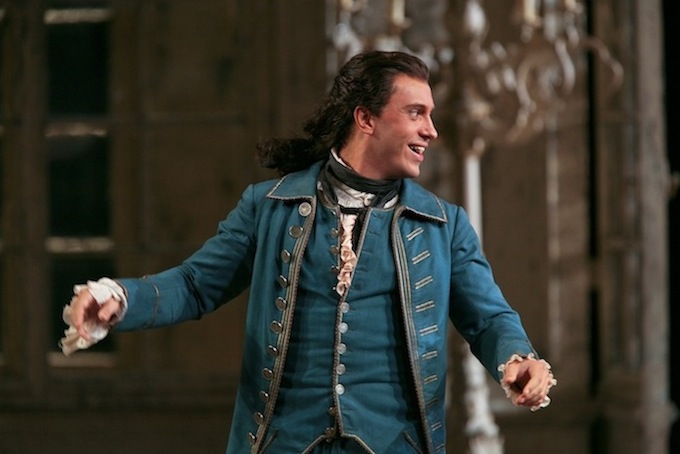Second cast by no means second best in Met’s delightful “Figaro”

Erwin Schrott stars in the new cast of Mozart’s “Le nozze di Figaro” at the Metropolitan Opera. Photo: Marty Sohl
In recent seasons, the Metropolitan Opera hasn’t always managed to put together inspired second casts for its major new productions. There’s often a feeling that the staging is simply propped up for a second run, with holes plugged by whoever is available.
Not so on Thursday, when the season-opening new production of Le Nozze di Figaro returned with a cast made up of several bona fide stars and a pair of stunning newcomers.
Richard Eyre’s “Country Life” staging of the opera is witty, entertaining, and nimble. The handsome rotating sets by Rob Howell divide the action into intelligently conceived compartments without interruption. The “Pause” listed in the playbill after the first act (which usually indicates an awkward, seated break of ten minutes or more) was little more than a chance for the orchestra to retune.
Moreover, Eyre’s approach to Mozart’s classic romantic comedy hits the nail on the head. He production understands that while sex is not exactly front-and-center in this opera, sexual tension and frustration are the driving forces behind the plot. His actors are all over each other, and yet none of them is ever really gratified.
Not even Count Almaviva, shown here as a prolific philanderer exchanging winks and glances with just about every woman in his household staff. Mariusz Kwiecien portrays the Count as an aggressive jerk—one who gets around plenty, but is never satisfied. The choice to make Almaviva a physically dominating brute is a valid one, but it makes the reconciliation of the final scene implausible, the sudden embrace of the troubled couple inexplicable and unsatisfying.
Vocally, Kwiecien has rarely sounded better. The role fit his muscular, taut baritone like a glove, and he sang with swaggering confidence all night. His performance of his Act III aria “Vedro mentr’io sospiro” was thrilling, coursing with dark fire, and earning the loudest cheer of the evening.
What made this truly one of the most exciting nights of the season, though, was a pair of brilliant debuts by two of the cast’s leading ladies. The Italian mezzo Serena Malfi was a joy to watch as a silly, foppish Cherubino, and her voice absolutely sparkled. She took “Non so più,” at a comfortable pace, her tone like flowing silver, and her “Voi che sapete” showed a glowing middle register and a crackling chest voice, with seamless transitions between the two.
American soprano Rachel Willis-Sørensen, also debuting, made a noble and kind-hearted Countess, lighting up the stage with a radiant smile. She sounded slightly nervous as she began “Porgi amor,” her voice small and a little steely up high. She settled in, though, with a blooming, blushing sound, culminating in a breathtaking account of “Dove sono.” Her tone here was pure gold, her high notes soaring and direct, her soft voice gossamer. Sensitive phrasing, and amazing poise as she transitioned from her weighty grief to resolve.
Next to those blinding debuts, the lead couple were overshadowed somewhat, though they did well in their own right. As Susanna, Danielle de Niese displayed her lovely caramel tone and lively vibrato. She tended to sound breathy when getting more expressive, which seemed more like a bad habit than anything really wrong with her voice or her technique. But no one has more fun onstage than de Niese, which in a buffa classic like this one is a pleasure to see.
Erwin Schrott, meanwhile, made an amiable Figaro, warming up after a slow start. In “Se vuol ballare” he seemed more concerned with powering through than with phrasing, but the time he reached “Non più andrai,” he embraced a husky, chocolate tone. In an interesting twist, Eyre keeps Almaviva onstage for this aria. It serves as much to chastise the Count’s roving eye as to steer young Cherubino on the path towards true love.
With all of these fine vocal performances, Edo de Waart was left in the dust. If Nozze is as crisp as a fresh apple, de Waart’s rendering was mealy. He brought little spark of imagination to this beautiful and imaginative score, and larger ensembles often seemed in danger of unravelling completely. Even the overture felt lackadaisical, almost sloppy.
John Del Carlo was just about ideal as Dr. Bartolo, scheming but jovial. Susanne Mentzer was a comically histrionic presence as Marcellina, and Alan Oke was a toadying Don Basilio. Ashley Emerson charmed as Barbarina, with a clear, chirping voice.
Le Nozze di Figaro runs through December 20 at the Metropolitan Opera. metoperafamily.org